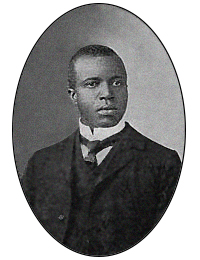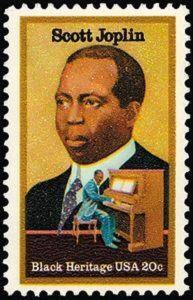
Scott Joplin is a historical and biographical drama (based on a true story) which premiered in 1977. In this biopic we can follow the life and career of the African-American composer and musician who is known as the king of ragtime music.
Here is some basic information about this drama:
** Directed by Jeremy Kagan
** Screenplay written by Christopher Knopf
** Scott’s music is arranged and performed by Richard Hyman
** Produced by Motown Productions
** Released on DVD in 2011
** Also available via Amazon Prime Video
** Run time: 96 minutes
The cast includes the following:
** Billy Dee Williams as Scott Joplin (1868-1917) – a musician
** Clifton Davis as Louis Chauvin (1881-1908) – a musician
** Margaret Avery as Belle Joplin – Scott’s first wife
** Eubie Blake as Will Williams – the judge in a musical competition held in Sedalia in 1899
** Godfrey Cambridge as Tom Turpin (1871-1922) – a musician and a businessman – the owner of a bar in St. Louis where ragtime music is often played
** Art Carney as John Stillwell Stark (1841-1927) – a seller of musical instruments and a publisher of ragtime music – occasionally a narrator
Since this drama is based on a true story, the basic facts are part of the public record. They are not a secret. Therefore, I feel free to mention some of them in this review. Besides, I have to mention a few details in order to explain my rating.
While this drama is based on a true story, it is not a documentary film. It is a dramatized version of events. Not everything happened exactly as shown here. Some details have been added or excluded for practical reasons or for dramatic purposes. But the basic story is true.
As stated in the title, Scott Joplin is the main character, but this movie does not cover his whole life from the beginning in 1868 to the end in 1917. The story begins in 1899; from this point in time we can follow his life and career for ca. 15 years, until 1914 or 1915, shortly before his death in 1917.
The story takes place in three different locations:
** From 1899 – we are in Sedalia, Missouri
** From 1901 – we are in St. Louis, Missouri
** From 1910 – we are in New York City, New York
In 1899, Scott Joplin and his friend Louis Chauvin enter a musical competition. During this event, they meet John Stark. When Stark hears Scott playing his rag time music on the piano, he is impressed. He invites him to visit his office.
Soon, they begin to work together: Scott will compose and write down his music, while Stark will publish and sell it. This is how Scott becomes a famous composer and a famous musician, first in Sedalia and later in St. Louis.
Among his well-known compositions, I will mention only two: Maple Leaf Rag (1899) and The Entertainer (1902). Obviously, both compositions are used in the movie.
Scott’s fame is growing, but it does not last long. When he moves to New York, his career is already beginning to go downhill. He is sick. He suffers from syphilis. Soon he cannot compose or play anymore.
When he dies in 1917, he is almost an anonymous person. And ragtime music is being replaced by jazz.
What do reviewers say about this historical and biographical drama? Here are the results of two review aggregators:
** 66 percent = IMDb
** 75 percent = Rotten tomatoes (the general audience)
On Amazon, there are more than 125 global reviews and ratings. The average rating is 4.4 stars.
If you ask me, the former rating (IMDb) is quite appropriate, while the ratings on Rotten Tomatoes and Amazon are too high. Why do I say this? I have five reasons:
# 1. The actor who plays Scott Joplin (Billy Dee Williams) and the actor who plays Louis Chauvin (Clifton Davis) look almost alike! It does not help that they also are dressed in the same style!
In the beginning, it is hard to tell who is the main character (Scott) and who is the sidekick (Louis).
After a while, you realize that they do not have the same haircut, but even after you have spotted this revealing detail, is it still hard to tell who is who.
Casting these two actors in the same movie was a most unfortunate decision!
# 2. Towards the end of the movie, Louis Chauvin is very sick. In fact, he is dying. When he is dead, Scott visits his grave in a cemetery.
On the tombstone, we can read the name Louis Chauvin and two dates: 1873-1908. But the first date is wrong! Louis Chauvin was born in 1881, and not in 1873. Why is there a false date on the tombstone?
# 3. Scott Hayden (1882-1915) is not seen in this movie. He is not even mentioned! This American musician and composer worked with Scott Joplin on several occasions. But he has been excluded. This does not seem fair.
# 4. Scott’s first wife (Belle Jones) appears briefly in this movie, but his second wife (Freddie Alexander) and his third wife (Lottie Stokes) are not seen in this movie. They are not even mentioned!
[When Scott Joplin met his future wife Belle, she was a widow whose last name was Hayden. Her deceased husband Charlie was Scott Hayden’s older brother. In other words: Belle was Scott Hayden’s sister-in-law.]
# 5. The movie is divided into two parts:
The first part (the first 60 minutes) is fascinating and uplifting for two reasons:
** the acting is great
** the music is fabulous
The second part (the final 30 minutes) is sad and depressing. I know the movie-makers want to show us how Scott’s life is falling apart during his final years. But the way in which they have chosen to do this is not successful. The movie suffers because of this. The movie begins to fall apart!
To support my case, I will quote the conclusion of a review by Peter Hanson posted on the blog “Every ‘70s Movie” on 11 December 2013:
“Thanks to infectious music and a sprinkling of interesting biographical details, this picture merits a casual viewing, although the subject matter deserved better than this wax-museum recitation.”
The topic is highly interesting. The story of Scott’s life and career deserves to be told. But in this movie, it is not done very well. It could have been a great movie about a great composer and a great musician. Unfortunately, it is not.
This movie is not great; it is not even good; it is just average. And therefore, it cannot get more than three stars.
PS # 1. In the 1970s, Scott’s music was re-discovered and a revival began. Some fifty years after his death, his music was finally getting the credit and the attention which it deserves. Here are some significant stages in this development:
** In 1970 = An album with some of Scott’s compositions performed by Joshua Rifkin is released.
** In 1973 = Marvin Hamlisch (1944-2012) adapts some of Scott’s compositions (including The Entertainer) and uses them in the musical score for the award-winning movie The Sting which is a major box office hit.
** In 1976 = Scott is given a posthumous award, a special Pulitzer Prize, for his contributions to American music.
** In 1977 = a biopic about Scott is produced by Motown Productions and released by Universal Studios (this is the movie which is under review here).
** In 1983 = the United States Postal service issues a stamp which shows the king of ragtime music.
PS # 2. Here is a link to Maple Leaf Rag (YouTube)
PS # 3. Here is a link to The Entertainer (YouTube)
*****

Scott Joplin (1868-1917)
*****

The stamp which shows Scott Joplin
issued by US Postal Service in 1983
*****
No comments:
Post a Comment